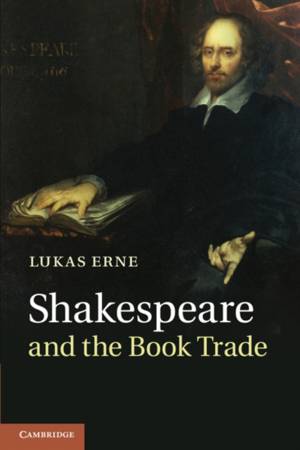
Bedankt voor het vertrouwen het afgelopen jaar! Om jou te bedanken bieden we GRATIS verzending (in België) aan op alles gedurende de hele maand januari.
- Afhalen na 1 uur in een winkel met voorraad
- In januari gratis thuislevering in België
- Ruim aanbod met 7 miljoen producten
Bedankt voor het vertrouwen het afgelopen jaar! Om jou te bedanken bieden we GRATIS verzending (in België) aan op alles gedurende de hele maand januari.
- Afhalen na 1 uur in een winkel met voorraad
- In januari gratis thuislevering in België
- Ruim aanbod met 7 miljoen producten
Zoeken
Omschrijving
Shakespeare and the Book Trade follows on from Lukas Erne's groundbreaking Shakespeare as Literary Dramatist to examine the publication, constitution, dissemination and reception of Shakespeare's printed plays and poems in his own time and to argue that their popularity in the book trade has been greatly underestimated. Erne uses evidence from Shakespeare's publishers and the printed works to show that in the final years of the sixteenth century and the early part of the seventeenth century, 'Shakespeare' became a name from which money could be made, a book-trade commodity in which publishers had significant investments and an author who was bought, read, excerpted and collected on a surprising scale. Erne argues that Shakespeare, far from indifferent to his popularity in print, was an interested and complicit witness to his rise as a print-published author. Thanks to the book trade, Shakespeare's authorial ambition started to become bibliographic reality during his lifetime.
Specificaties
Betrokkenen
- Auteur(s):
- Uitgeverij:
Inhoud
- Aantal bladzijden:
- 316
- Taal:
- Engels
Eigenschappen
- Productcode (EAN):
- 9781316507582
- Verschijningsdatum:
- 14/10/2015
- Uitvoering:
- Paperback
- Formaat:
- Trade paperback (VS)
- Afmetingen:
- 152 mm x 230 mm
- Gewicht:
- 494 g

Alleen bij Standaard Boekhandel
+ 129 punten op je klantenkaart van Standaard Boekhandel
Beoordelingen
We publiceren alleen reviews die voldoen aan de voorwaarden voor reviews. Bekijk onze voorwaarden voor reviews.









